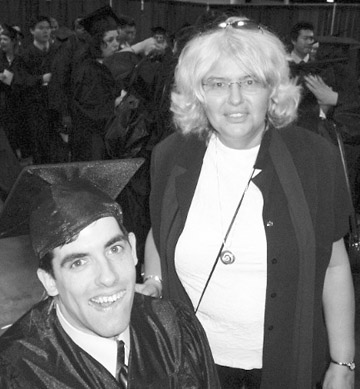Seniors Hit Hard by Loss of Waivers
February 13, 2004
As many as 160 UMB seniors were surprised to find that they would have to pay their educational fees in full for the spring semster, leaving many struggling to pay the bill or unable to attend classes.
The elimination of the fee waiver raises the average payment for a senior citizen from $45 to more than $800 per class. No notice whatsoever was given to seniors, according to Dr. Suzanne Saul, currently enrolled in the Creative Writing program at UMB. “No one said a word when I went to the registrar before the holidays,” said Saul in a recent e-mail.
Upset at finding out so late that she would not be able to attend spring classes, Saul tried to find out what had happened. “I made 10 calls to UMB…trying to track down who knew what, when. A mystery. They all seemed to know, but then why didn’t anyone tell me when I called about registration AS A SENIOR?”
Joe Panciotti, former Student Senate president, who turned 60 in 2002, confirmed that none of the seniors affected by the waiver elimination were notified. Panciotti said that he is covering the jump in fees through loans, but that many seniors are “going to have their financial aid packages turned on their heads.”
The decision to eliminate the fee waivers was made public in August, 2003. In Chancellor Jo Ann Gora’s Aug 4 memo detailing the budget cuts, she noted that the decision to cut senior fee waivers had raied “many concerns” and had therefore postponed eliminating the fee waivers until spring. The decision to cut senior fee waivers was also noted in the Sept 4, 2003 Mass Media. The Mass Media was unable to reach administration officials for comment on this story.
Most seniors are still eligible for financial aid programs that can reduce the cost of fees through loans and grants, but for many, like Saul, there is no chance they will be able to attend regularly scheduled classes this semester. Loans, which most students use to pay for their education, also represent a burden for seniors that they will likely never be able to shift because they aren’t in the workforce and won’t see any financial gains from a degree earned late in life.
Senior fee waivers have been eliminated for “state-supported” or regularly scheduled university classes, but classes offered through the Continuing, Corporate and Distance Education program have not. CCDE is required by law to make courses affordable for seniors and will still cost $45 for seniors.
Removing the senior fee waiver has been controversial from the beginning. The cuts to the fee waivers were first mentioned in a report by the Committee on University Revenues and Expenditures. Eliminating the senior fee waiver program was estimated to save the university more than $300,000 dollars. After being postponed until spring 2004, savings are estimated at $180,000.
The budget cuts, which were announced last summer, come in response to a 30% budget reduction over the last three years. Fees are primary source of adjustable funding by the university, because the Board of Trustees for the UMass system can change the fees at will, but tuition is set by the State Senate. Tuition has remained extremely low as fees have increased. A full-time resident undergraduate student pays around $800 for tuition, while fees mount into the thousands.
Seniors are particularly vulnerable to money woes, according to Saul, who sees a need for accessible education. “I know that the classes made possible by tuition waivers are a life-line for the Seniors who use them,”
“The AARP would have you believe that we all have gorgeous false teeth, Bermuda shorts, and a set of golf clubs we regularly employ on seaside links in southern climes. It isn’t true.”























































